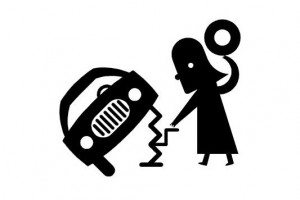As of July 1, 2013, it is officially a crime (third degree felony) for an unlicensed person to pick up a voluntary repossession in the state of Florida (Florida Statute 493.6120). The upshot of this is that it is illegal for an auction or transporter or any other entity to pick up a vehicle from a consumer…by law, has to be done by a state-licensed repossessor.
Is this unfair? Since it’s a voluntary, doesn’t it make sense for an auction or transporter to pick up a proverbial “sitting duck” and save the creditor a little money?
The simple…and realistic…answers are “no” and “no”. In fact, this new legislation makes perfect sense. And here’s why.
1.) Voluntaries Can Be Dangerous. Several high profile cases have occured which either the debtor or the repossessor were killed or injured during the course of a voluntary repossession (for example, see: http://www.huffingtonpost.com/2012/03/22/repo-men-violence-big-lenders-auto-repossession_n_1354673.html). Its clear that voluntaries should be handled by not only licensed repossessors, but ones specifically trained on the issues of breach of peace, and ones that have extensive experience in properly handling potentially volatile situations. (note: members of one national trade association, Time Finance Adjusters, have undergone extensive training in Situational Awareness Training/Conflict Avoidance Techniques, in preparing for situations that could turn hostile). Even benign-looking repo accounts can blow up at the scene. All this is way beyond the scope of any training received by a typical auction transporter.
2.) The Term “Voluntary” Can Be Inaccurate. Virtually every seasoned repossessor can tell stories on how they were sent out on a voluntary based on a conversation between the debtor and the creditor where the debtor said “come out and get your #&% car” . These so-called voluntaries often involve hours talking down a still-fuming debtor who is raging about the creditor, or about the dealer, or about the car itself. Between missed appointments and conflict management at the point of repossession, they can be very time consuming. The truth is, debtor cooperation extends over a continuum, so from a legal standpoint, it makes sense that voluntaries are viewed the same as self-help repossessions in the eyes of the law.
3.) Voluntaries Pose Legal Risks To The Lender. A transporter contacts a neighbor to ask when Mr. Jones might come home with his Hyundai…he’s here to repossess it (violation of the FDCPA).
Or the customer forgets to remove her tag, and later finds out the auction threw it away instead of holding it for 45 days (a violation of personal property laws in several states, or DMV laws in others).
Or a drunk neighbor gets involved and an altercation occurs; only later the bank discovers in deposition that the transporter has a criminal history (lender would be responsible under federal EEOC rules).
We don’t denigrate transporters at all. They know their field better than we do. But conversely, we live and breathe these issues everyday. Let’s face it, even the best transporters or a tow service are not going to know the intricacies of state or federal laws regarding the repossession process. They don’t receive training regarding dealing with debtors. And, for the most part a criminal backround check is unnecessary in their business. They don’t come under the review and enforcement of government agencies that want to police this incredibly risky collection practice.
4.) Voluntaries Can Be Ultimately More Expensive. A transporter is not going to know the UCC Section 9’s view of “accessions” (UCC 9-102), and is not going to intelligently challenge the debtor’s onsite removal of stereos or aftermarket rims…which is a discussion trained repossessors have with debtors almost every day. (In fact, knowing in advance when a repossession will occur increases the likelihood the debtor will want to remove items that legally should be part of the collateral). 
Where’s the savings by getting the repossession done for $100 less, but having the vehicle do $1,000 less rolling through the auction lane on 4 “donut” tires, or with a hole in the dash?
The State of Florida believes it is important to license and regulate any individual or company that interacts with the customer in the repossession process, under any terms. The state recognizes that even in the best case scenario, a voluntary repossession carries an element of both legal and physical risk for those involved, and should be handled on someone with training and a license to do so.
We think America’s lending community ought to feel the same way.

